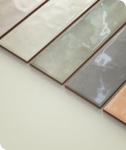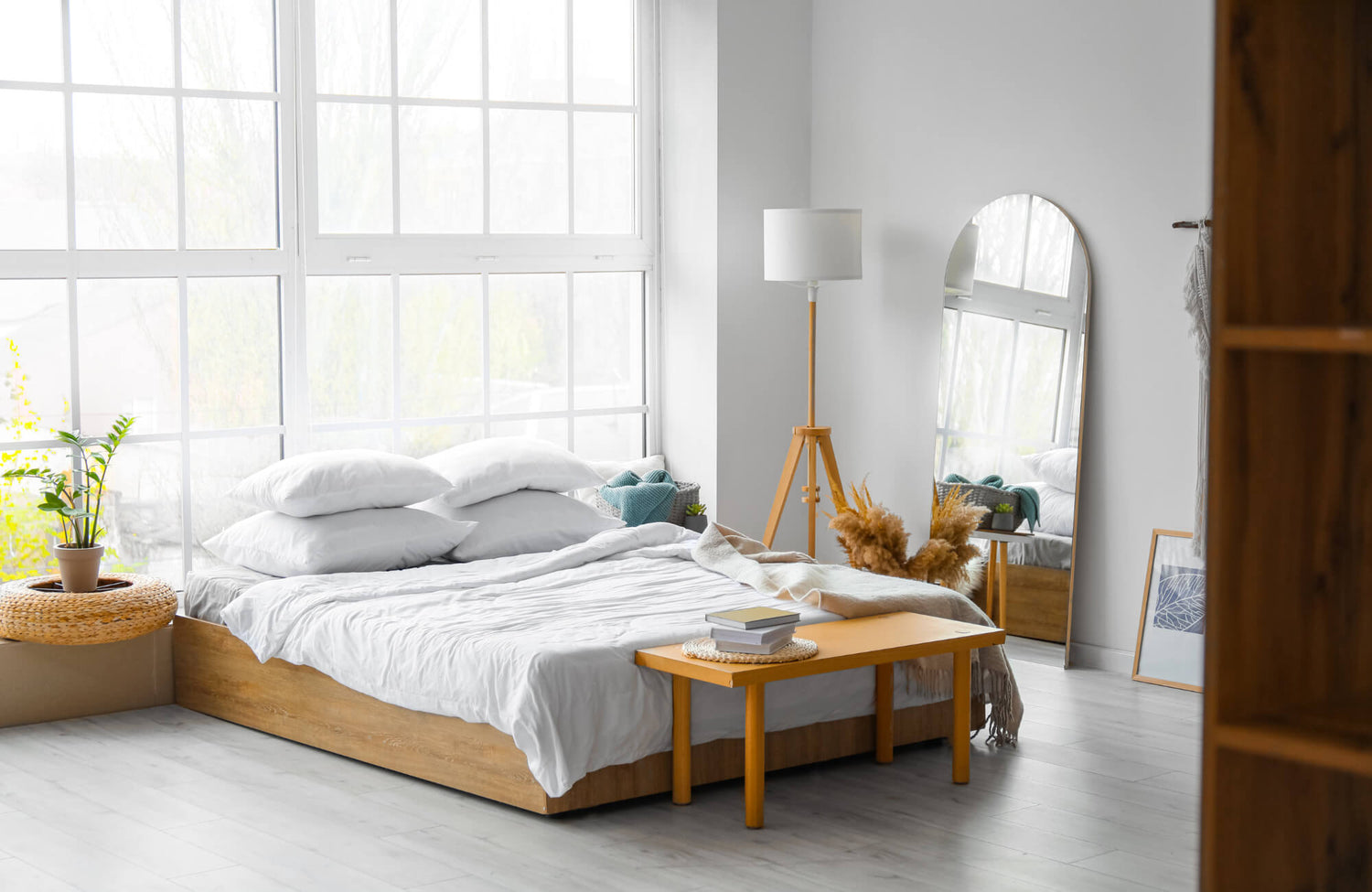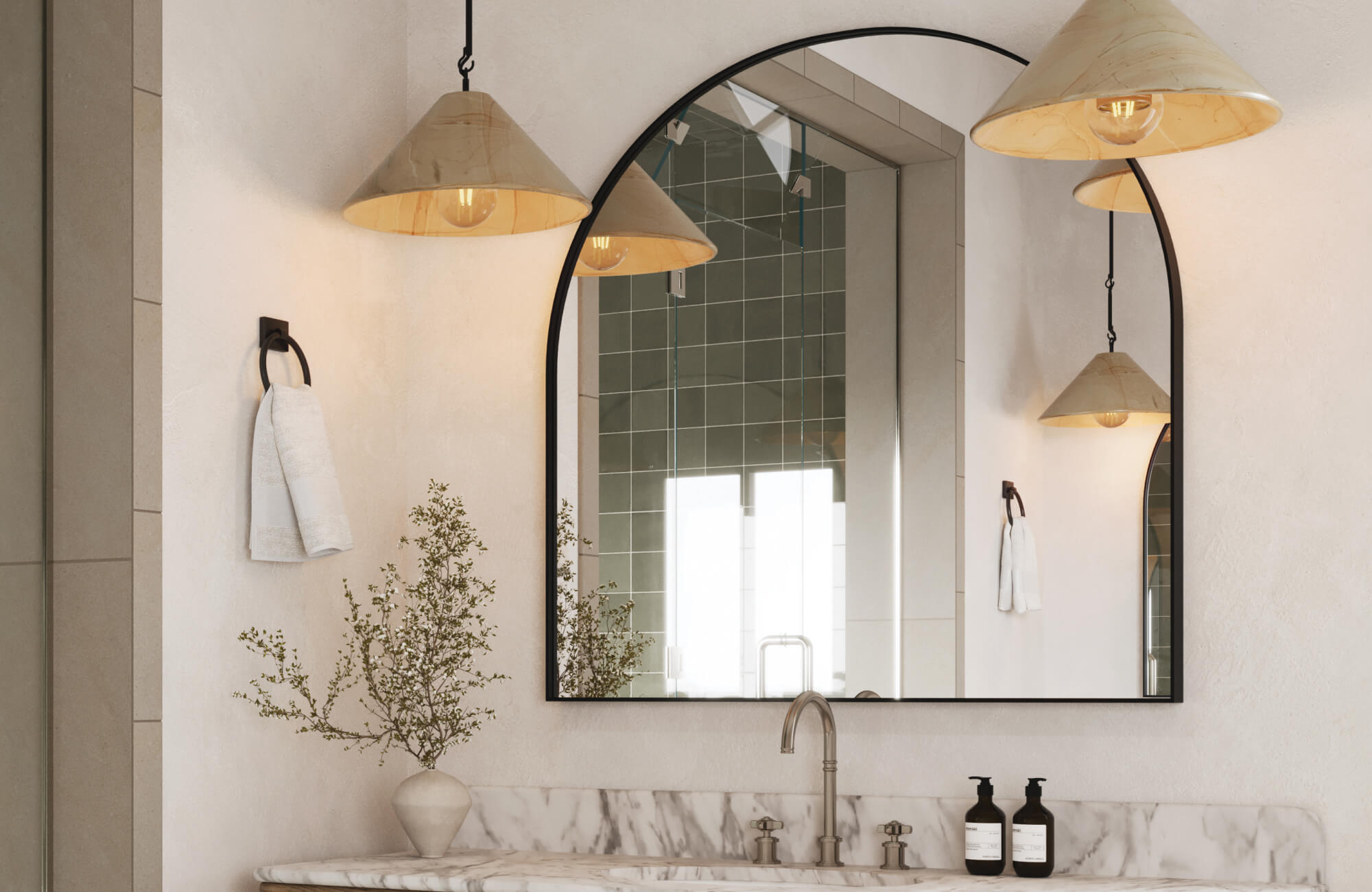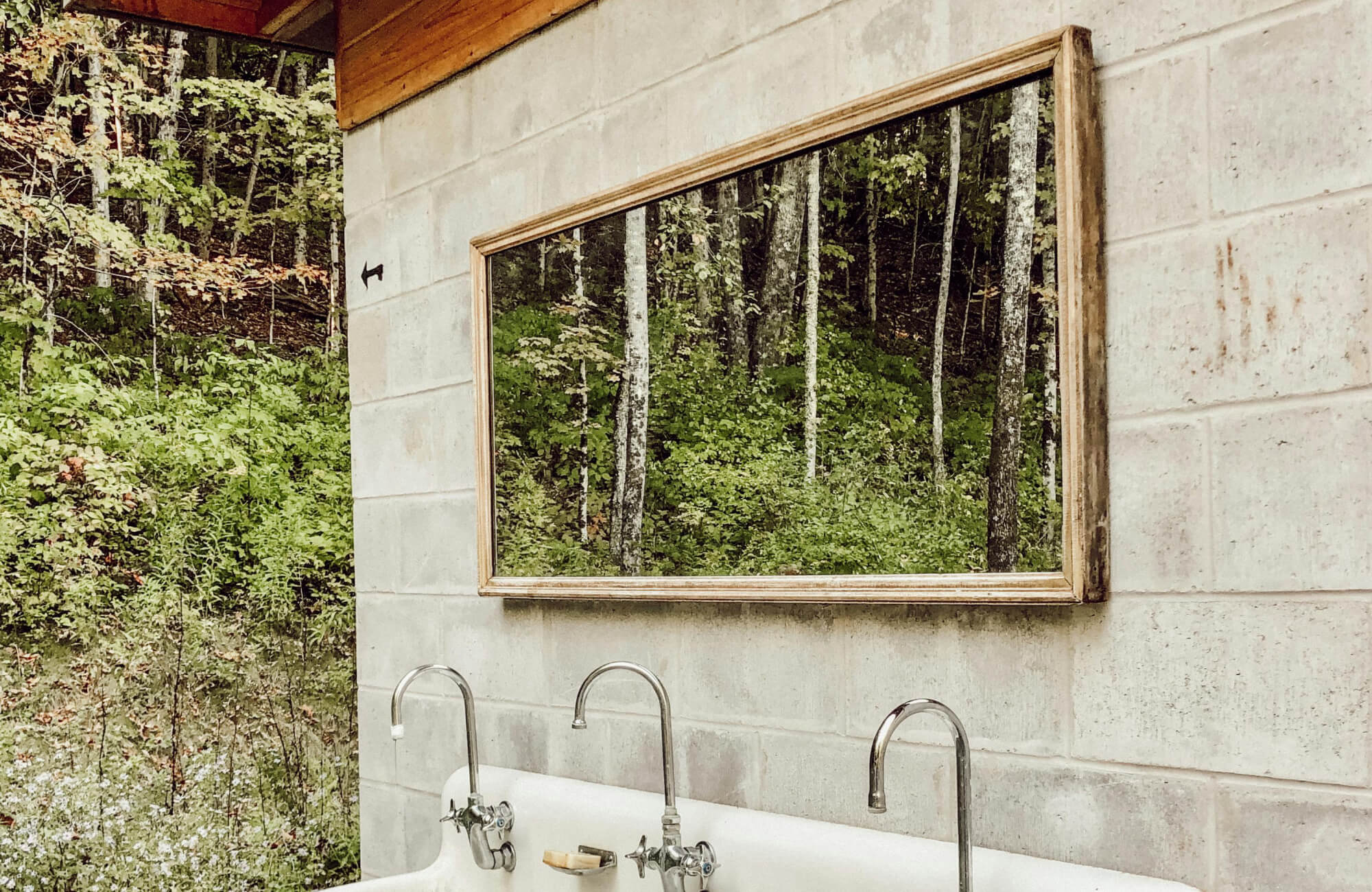Mirrors do more than reflect; they shape the energy, mood, and perception of your space. In Feng Shui, they’re powerful tools used to redirect qi, the life force that flows through your home, influencing everything from harmony to prosperity. But their effectiveness depends on more than style or placement alone; a mirror can balance energy or disrupt it entirely depending on where and how it’s used.
Far from being purely decorative, mirrors in Feng Shui serve as functional remedies, softening harsh lines, symbolically restoring missing spaces, and amplifying light and movement. For decorators and property owners, mastering their use is key to creating both aesthetic cohesion and energetic balance. In this blog, we’ll explore how Edward Martin’s expert guidance can help you use mirrors to elevate your home’s Feng Shui with intention and clarity.

The Foundational Principles of Feng Shui and Mirrors
To truly understand how mirrors influence your home’s Feng Shui, it’s important to start with the basics, specifically, the role of chi and how mirrors interact with the elemental forces that shape a space. By grounding your approach in these core principles, you can begin to use mirrors with both purpose and precision.
What is Chi, and Why is its Flow Important?
At the core of Feng Shui is chi, the life force that moves through all things, shaping the mood, health, and prosperity of a space. For optimal balance, chi should circulate smoothly; stagnation or overly rapid movement can create tension or imbalance. This is where mirrors become especially influential: they can gently guide chi by reflecting light and space, or, conversely, disrupt flow if positioned to amplify negative features like clutter or sharp architectural corners.
Mirrors as the Water Element
Building on this energetic foundation, it’s also important to understand the elemental nature of mirrors. In Feng Shui, mirrors are associated with the Water element, one of the Five Elements (Wood, Fire, Earth, Metal, and Water), because of their reflective and fluid qualities. Water symbolizes adaptability, wisdom, and flow, making mirrors effective tools for introducing calm and promoting communication.
Additionally, mirrors can be used to temper imbalances in other elements. For instance, placing a mirror in a Fire-dominant room (marked by bright colors, sharp shapes, or intense activity) can soften the energetic intensity. Likewise, mirrors are often used intentionally in the North area of the Bagua map, the zone related to career and life path, which is governed by Water. However, moderation is key. Overuse of mirrors, especially in already Water-heavy spaces, can introduce a sense of instability or emotional unpredictability.
To strike the right balance, consider the mirror’s shape and material. For example, round or wavy mirrors enhance Water’s fluidity and grace, while square or metal-framed mirrors may add Earth or Metal influences, subtly shifting the energy toward groundedness or clarity.

Strategic Mirror Placement for Enhanced Energy
Once you grasp how mirrors influence energy in Feng Shui, the next step is learning where to place them for maximum impact. From enhancing natural light to reinforcing abundance, thoughtful placement can transform both the energy and experience of a space.
Amplifying Light and Expanding Space
To begin with, mirrors are among Feng Shui’s most effective tools for brightening interiors and enhancing spaciousness. When positioned opposite or adjacent to windows, they reflect natural light deeper into the home, activating stagnant chi and increasing vibrancy. This is particularly valuable in dim or compact areas where energy tends to stagnate. As a result, mirrors not only make rooms feel more open but also help restore yin-yang balance by energizing underused spaces like entryways or quiet corners.
Brightening Dark Corners and Hallways
Building on that, mirrors also offer simple yet powerful remedies for dark, low-energy zones such as corners or narrow hallways. These areas often trap chi and foster sluggishness. By reflecting light from nearby sources, natural or artificial, mirrors can awaken and mobilize these stagnant pockets. In hallways specifically, placing mirrors on side walls (rather than at the end) slows the pace of chi and allows for more even circulation throughout the corridor.
Creating a Sense of Openness in Small Rooms
Similarly, in compact spaces like powder rooms, home offices, or small bedrooms, mirrors serve a dual function. Not only do they visually expand the room, but they also boost chi circulation, alleviating sensations of confinement. That said, it’s important to avoid placing mirrors directly across from beds or desks, as their reflective energy can overstimulate the nervous system or disrupt mental focus and rest.
Doubling Abundance and Prosperity
Beyond spatial enhancement, mirrors also carry symbolic power in Feng Shui. Because they double what they reflect, placing a mirror near symbols of wealth, such as lush plants, a bowl of fresh fruit, or meaningful décor, can energetically amplify abundance. This is especially effective when placed in the far-left corner of the main entrance, known as the wealth area of the Bagua map. However, be mindful not to reflect clutter or broken objects, which can instead multiply stagnation or scarcity.
For example, the Fitz Mirror in Antique Brass from Edward Martin elegantly demonstrates this principle. Featured above, its clean circular frame and subtle metallic warmth effortlessly enhance both light and the energy of abundance-related items, while fitting into a variety of interior styles.
Reflecting the Dining Area
In much the same way, mirrors used in dining rooms carry strong energetic symbolism. Traditionally associated with nourishment and family unity, the dining table is an ideal subject to reflect on. Doing so effectively “doubles” the presence of food, a long-standing symbol of health and prosperity. To maximize this effect, ensure the mirror offers a clear, undistorted view of the full table; partial reflections may metaphorically reduce these benefits.
Enhancing Views of Nature and Positive Art
Finally, mirrors can be used to extend high-vibration imagery, such as natural landscapes, garden views, or inspiring artwork. This approach amplifies Sheng Chi, life-enhancing energy, by reinforcing feelings of vitality, serenity, and joy. When doing so, select mirror placements and frames that harmonize with the reflected subject, ensuring they elevate rather than distract from its presence.

Areas to Exercise Caution with Mirrors
While mirrors can be powerful tools in Feng Shui, their benefits depend entirely on mindful placement. Missteps, like reflecting clutter or placing mirrors opposite the front door, can unintentionally disrupt chi and invite imbalance rather than harmony.
Avoiding Reflection of Negative Chi
To begin with, it’s essential to understand that mirrors amplify whatever they reflect, whether beneficial or detrimental. When they capture Sha Chi, such as sharp architectural corners (“poison arrows”), cluttered areas, or emotionally charged imagery, they intensify those chaotic energies. This can lead to heightened stress or energetic stagnation. Therefore, performing a regular “reflection audit” is a practical way to identify and correct such visual disruptions. In particular, avoid placing mirrors across from utility zones, disorganized workspaces, or décor that carries low emotional vibration.
As illustrated in the image above, the Esmeralda Wide Mirror in Iron Matte Black by Edward Martin exemplifies thoughtful integration. Its soft, arched shape and subdued finish gently counterbalance bold architectural lines, especially when paired with grounding elements like plants or richly textured surfaces. This intentional pairing enhances both the aesthetic harmony and energetic balance of the space.
Mirrors Facing the Front Door
Next, consider the energy dynamics at your home’s entrance. The front door, known in Feng Shui as the “mouth of chi”, is the primary portal through which energy enters the space. When a mirror is placed directly opposite the front door, it’s believed to reflect energy back out, preventing it from flowing inward and nourishing the interior. Psychologically, this setup can create a sense of transience or instability. To maintain a welcoming flow, it’s best to position mirrors on adjacent walls instead, gently guiding chi throughout the home.
Mirrors Reflecting Toilets or Clutter
In a similar vein, bathrooms are seen as zones of energy drainage, and mirrors that reflect toilets, sinks, or clutter only intensify this effect. This is particularly disruptive in Bagua zones associated with wealth, health, or relationships. To mitigate this, avoid direct reflections of these features wherever possible. If adjustments aren’t feasible, simple remedies like keeping the bathroom door closed or incorporating stabilizing decor, such as grounding plants or earthy hues, can help rebalance the space.
The Bedroom Mirror Dilemma
Moving into the bedroom, Feng Shui calls for yin energy to support rest, intimacy, and renewal. Yet mirrors, being inherently yang, introduce active, stimulating energy. Even mirrored wardrobes or decorative panels can subtly interfere with relaxation and emotional balance. As a general guideline, limit mirror use in bedrooms and ensure that none face the sleeping area directly.
Mirrors Directly Facing the Bed
This leads to one of the most widely flagged Feng Shui concerns: mirrors facing the bed. Such positioning is thought to disturb sleep, increase anxiety, and even symbolically “split” relationship energy, posing challenges for couples. If relocating the mirror isn’t an option, consider a simple workaround: cover it at night with a decorative cloth or curtain to shield the energy while sleeping.
Overly Stimulating Reflections in the Bedroom
Finally, even mirrors placed away from the bed can be problematic if they reflect overly stimulating visuals, such as workout equipment, TV screens, or active workstations. These reflections may subtly keep the nervous system alert, counteracting the restful tone of the room. To avoid this, choose smaller mirrors with soft, rounded edges and place them in calm, non-reflective sightlines that support relaxation and restoration.

Shapes and Styles of Mirrors for Feng Shui
Beyond placement, a mirror’s shape and style significantly influence the kind of energy it introduces into your home. From the symbolism of forms to the elemental qualities of frames, these design details can subtly, but powerfully, shift the flow of chi in your space.
Harmonious Mirror Shapes
To begin with, mirror shapes are not just aesthetic choices; they carry energetic significance. In Feng Shui, each form corresponds to a specific element from the Five Elements system: circles align with Metal, rectangles with Wood, squares with Earth, and so forth. Therefore, selecting a shape that matches the room’s purpose and elemental balance ensures that the mirror enhances rather than disrupts the chi flow. This approach allows the mirror to function as both a design accent and a supportive energetic presence.
Rectangular and Square Mirrors for Stability
Building on that, rectangular and square mirrors are among the most grounding options in Feng Shui. Square mirrors are symbolic of Earth energy, making them ideal for dining rooms, family spaces, or anywhere stability and support are needed. Meanwhile, rectangular mirrors, especially those oriented vertically, represent the Wood element, promoting growth, structure, and forward movement. These shapes are particularly useful in hallways, studies, or areas that benefit from orderly chi circulation.
As shown in the photo above, the Tristan Square Mirror in Polished Brass from Edward Martin is a prime example of this concept. Its softened square silhouette and luminous frame enhance both the energetic and visual symmetry of a room, bringing clarity, elegance, and stability into harmonious balance.
Round and Oval Mirrors for Flow
In contrast, round and oval mirrors offer a much softer energetic profile. Associated with the Metal element, these shapes encourage smooth chi movement, clarity, and emotional harmony. As a result, they are especially effective in areas where calmness and connection are desired, such as bedrooms, meditation rooms, or social spaces. Their curved edges help mitigate angular tension from surrounding architecture, creating a more peaceful, flowing environment.
Mirror Frames and Materials
Beyond shape, the frame of a mirror further influences its energy output. Acting as a visual and symbolic boundary, the frame’s material and design help determine the elemental qualities it enhances.
For instance, wood frames activate the Wood element, promoting vitality, creativity, and growth. These are ideal for zones related to career or family, particularly when crafted in natural textures or light stains. Conversely, deeper wood tones provide a grounding effect in more contemplative environments.
Meanwhile, metal frames, like those in matte black or brushed nickel, amplify the Metal element, fostering focus, precision, and mental clarity. These styles work particularly well in minimalist interiors, offices, or Bagua sectors linked to creativity or helpful people.
Additionally, more decorative or carved frames may evoke the Fire element, adding dynamic energy and passion, while stone, terracotta, or earth-toned finishes align with the Earth element, encouraging stability and nourishment.

Advanced Mirror Applications and Cures
Once you've mastered the basics, mirrors can take on a more strategic role, offering targeted solutions to architectural challenges that disrupt the natural flow of energy. With the right approach, they can correct imbalances, soften harsh lines, and even symbolically restore parts of the home that feel energetically incomplete.
Correcting Missing Bagua Areas
To begin with, irregular or L-shaped floor plans can create gaps in the Bagua map, an energetic blueprint representing different life areas such as wealth, relationships, and health. These voids may result in certain aspects of life feeling unsupported or stagnant. Fortunately, mirrors offer a symbolic solution: when placed on the interior wall adjacent to the missing sector, they visually and energetically “reclaim” the lost space. This approach reintegrates chi and supports a more harmonious flow throughout the home. To ensure effectiveness, choose a mirror proportionate to the missing area and mount it flat against the wall to reinforce its stabilizing effect.
Using Mirrors to "Extend" Missing Corners
In a related application, mirrors can also be used to extend or complete truncated architectural corners. These are often found in homes with L-shaped designs or post-construction additions, where visual and energetic boundaries feel disrupted. By installing a mirror in the interior angle facing the missing section, you create the illusion of architectural continuity. This not only stabilizes chi but also reinforces a sense of wholeness. For best results, consider pairing the mirror with complementary elements like lighting or greenery to anchor the energetic extension visually and emotionally.
Mitigating "Poison Arrows" and Sharp Angles
Next, mirrors prove invaluable in neutralizing harsh energy known as Sha Chi. Often created by sharp architectural edges, like protruding corners, beams, or furniture, this aggressive energy can undermine rest, focus, and emotional equilibrium. Strategically placing a mirror to reflect these angles away from key functional zones (like beds, desks, or sofas) can redirect the energy safely out of the room. Additionally, mirrors with soft edges or organic shapes are especially beneficial, as they temper the deflection and reduce overall intensity.
As illustrated in the image above, the Rory Mirror in Matte Black by Edward Martin is a fitting example. With its sculptural, asymmetrical form and matte finish, it gently disrupts sharp visual lines and contributes a calming, restorative influence, ideal for spaces that benefit from energetic softening.
Deflecting Undesirable Energy Flows
Furthermore, mirrors can serve as energetic boundaries or shields when faced with challenging external environments. Whether your home is located near a T-junction, beneath a sharp roofline, or beside a heavily used road, a mirror placed on an exterior wall or near a window can deflect this disruptive energy. Similarly, inside the home, mirrors help resolve tension between conflicting spaces, for instance, a bathroom door directly facing a kitchen or bedroom. In such cases, a carefully placed mirror can redirect and neutralize the energetic clash, preserving harmony between zones.
However, to be effective, these mirrors must be clean, intact, and positioned with deliberate intention. A cracked or dusty mirror can scatter rather than harmonize chi, undermining the intended cure.
Finally, if you’re unsure where to begin or need guidance tailored to your space, Edward Martin’s design consultation service offers personalized support. From product selection to mirror placement strategies and holistic layout refinement, their one-on-one guidance ensures your design choices align with both your aesthetic goals and Feng Shui principles.
Have questions about integrating mirrors, selecting materials, or achieving spatial balance? Don’t hesitate to contact us, Edward Martin’s team is ready to support you at any stage of your design journey.

Maintenance and Mindset for Mirror Feng Shui
Even the best-placed mirror won’t support positive chi if it’s neglected or misaligned with your intentions. To keep mirrors working as effective Feng Shui tools, it’s just as important to maintain their physical condition as it is to stay mindful of the energy they reflect.
Keeping Mirrors Clean and Intact
To begin with, mirrors demand consistent care; dust, smudges, or fingerprints not only dull their appearance but symbolically reflect confusion or blocked opportunities. From an energetic perspective, a clean surface encourages movement, uplifts chi, and enhances the mirror’s role as a conduit of light. For this reason, natural, non-toxic cleaners are recommended to prevent the introduction of harsh chemical energy. Moreover, for best results, always consult the manufacturer’s maintenance guidelines to preserve the mirror’s finish and overall integrity.
An excellent example of this principle in action is Edward Martin’s Shirley Large Mirror in Antique Brass Iron. Its organic brass frame and sculptural form elevate both style and energy, especially when kept spotless, allowing it to reflect both light and intention with clarity and precision.
The Importance of a Clear Reflection
In a similar vein, clarity in reflection parallels clarity in thought and self-perception. Warped, aged, or poorly lit mirrors can subtly reinforce confusion, doubt, or diminished confidence. This is particularly important in busy areas like entryways, bathrooms, and bedrooms, where the mirror’s reflection influences both personal identity and spatial awareness. Ensuring a sharp, undistorted image helps solidify a grounded and empowered sense of self.
Replacing Broken or Chipped Mirrors
Equally important, cracked or chipped mirrors are considered highly inauspicious in Feng Shui. Not only do they disrupt the flow of light and chi, but they also carry symbolic associations with fragmentation or instability. Even seemingly minor imperfections can interfere with harmony and coherence in the home. Thus, replacing damaged mirrors is essential to restore both energetic and visual integrity.
Intention and Personal Connection
Beyond maintenance, Feng Shui is rooted in mindset. A mirror becomes more than a decorative piece when it’s imbued with intention, whether the focus is clarity, abundance, or self-worth. Before installation, take a brief moment to set a personal goal or affirmation. This simple act transforms the mirror into a reflective ally that aligns with your inner vision and reinforces your energetic goals.
Aligning Mirrors with Your Goals
Furthermore, for mirrors to truly support your life path, their placement should correspond to your intentions as outlined in the Bagua map. For instance, a mirror placed in the North sector (career) might reflect a symbol of success, while one in the Southeast (wealth) could double an image of abundance. In both cases, the reflection should act as a visual affirmation, supporting your aspirations both literally and symbolically.
Regular Review and Adjustment
Over time, your personal goals and environmental needs may evolve. As such, it’s essential to periodically reassess mirror placement and function. Small adjustments, like repositioning a mirror to capture a more inspiring view or optimizing light, can revitalize chi and bring your space into renewed alignment with your current path. Consider conducting a seasonal or annual check-in to keep your Feng Shui strategy responsive and intentional.
Unlocking the Full Potential of Feng Shui with Mirrors
Hence, mirrors, when used with clarity and care, become more than decorative accents. They serve as precise instruments for directing chi, balancing spatial energy, and shaping the emotional tone of your home. Whether you're correcting architectural gaps, reflecting abundance, or reinforcing your personal intentions, the subtle influence of mirrors can create a profound energetic shift.
At Edward Martin, we believe that great design lies where aesthetics and purpose meet. If you’re ready to invite more harmony, clarity, and depth into your space, our team is here to help you make every reflection count.







